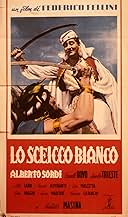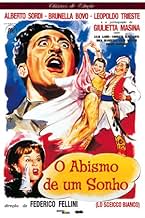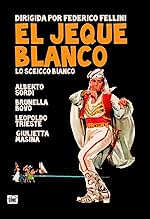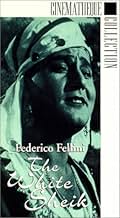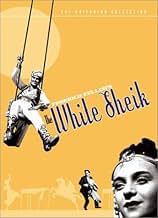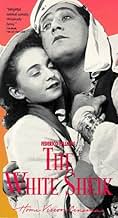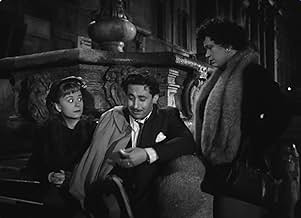IMDb RATING
7.2/10
7.3K
YOUR RATING
During a day of their honeymoon, newlyweds are separated by the city's lust and the desires it produces.During a day of their honeymoon, newlyweds are separated by the city's lust and the desires it produces.During a day of their honeymoon, newlyweds are separated by the city's lust and the desires it produces.
- Awards
- 1 nomination total
Aroldino the Comedian
- Cugino Aroldino
- (as Aroldino)
Featured reviews
When most people think of Fellini, they think of his films La Strada or La Dolce Vita and 8 1/2, but the director's vast catalogue of films is worth checking out just to see a genius at work. Fellini's early and little known film, The White Sheik proves to be a cinematic gem that not only hints at the director Fellini would become, but also stands on its own as an achievement.
Part soap opera (read Mexican soaps) and part romantic comedy, The White Sheik leans towards surrealism and comic book camp (over 30 years before Kevin Smith created DOGMA). The premise of the story is that two newly weds, Vanda Giardino (Bruenella Boro) and her husband Ivan Cavelli (Leopoldo Trieste) honeymoon in Rome where Ivan hopes to make a good impression of his relations. Unfortunately for him, his wife sneaks out of the hotel room so that she can meet her comic book hero, The White Sheik (Alberto Sordi.
Shot in black and white, this film is gorgeous and surreal. The actors on the set of The White Sheik come across as gypsy or circus like. They sport tough attitudes and this makes a nice contrast to Vanda's wide-eyed innocence.
The White Sheik is technically Fellini's second film, but the first one in which he did not share directing credits. However, he did share writing credits with Michelangelo Antonioni, Ennio Flaiano and Tullio Pinelli. If you are a fan of La Strada and Nights of Cabiria then you must see this film.
Part soap opera (read Mexican soaps) and part romantic comedy, The White Sheik leans towards surrealism and comic book camp (over 30 years before Kevin Smith created DOGMA). The premise of the story is that two newly weds, Vanda Giardino (Bruenella Boro) and her husband Ivan Cavelli (Leopoldo Trieste) honeymoon in Rome where Ivan hopes to make a good impression of his relations. Unfortunately for him, his wife sneaks out of the hotel room so that she can meet her comic book hero, The White Sheik (Alberto Sordi.
Shot in black and white, this film is gorgeous and surreal. The actors on the set of The White Sheik come across as gypsy or circus like. They sport tough attitudes and this makes a nice contrast to Vanda's wide-eyed innocence.
The White Sheik is technically Fellini's second film, but the first one in which he did not share directing credits. However, he did share writing credits with Michelangelo Antonioni, Ennio Flaiano and Tullio Pinelli. If you are a fan of La Strada and Nights of Cabiria then you must see this film.
The first solo effort of Fellini allowed to me to correct a misconception: no, he didn't start with neo-realism for his "White Sheikh". However it is possible that the film's poor reception inclined him toward the neo-realistic wave and meet success with "I Vitelloni", "Il Bidone", "La Strada" and naturally "Nights of Cabiria". So, Fellini took time to mature his work and master his craft before getting back to that "art of unpredictability" you can see budding in his 1952 debut.
So I was wondering who "The White Sheikh" was but quickly figured the right question should begin with 'what'? It is a concept, the incarnation of an artistic phenomenon that struck post-war Italy: soap opera photo strip or as the French call it: "roman-photo". These 'fotoromanzi' made of still photographs of characters with bubbles added afterwards had plunged the targeted young ragazze into dreams of escapism full of dashing cavaliers, dark and brooding strangers or exotic princes, they found in these stories much needed loopholes in a country dominated by religion and patriarchy.
And while the script was co-written by Michaelangelo Antonioni and Tunio Pinnelli, there are reasons why Fellini was the right man for the right project. He started as a a cartoonist drawing and writing funny pictures to the American GIs, he commented on the juicy business it was giving him his first taste of success as inebriated soldiers would by anything at any price. And more than anyone, he knew the double appeal of images: they related to people and their stillness and differences one vignette from another could let imagination fill the blanks. And we know the value of imagination in the Maestro's work.
And it so happens that this world fascinates Wanda (Brunella Bovo) a young and timid newlywed girl who'd just arrived in Rome with Ivan, played by wide-eyed Leopoldo Trieste. Ivan planned the whole weekend in a tight schedule that includes meeting the family, eating in a fancy restaurant, fulfilling the 'honeymoon' duty, having some rest and last but not least: meeting the Pope on Sunday. Ivan is a man of order -more out of necessity than principles- but something in Wanda's apparent passiveness betrays some burning passion, she's like a frail trophy wife whose mind is so distracted she lets Ivan take full reins.
But when she learns that the street where her favorite magazine is printed is ten minutes away from the hotel, she seizes the opportunity of a bath to leave Ivan. Hot water floods the hotel, Ivan discovers the note Wanda got from her "White Sheikh" idol and well, confusion ensues. Basically, there are two journeys in the film: Wanda discovering the backstage of her dreams, and Ivan who tries desperately, pathetically and frantically to keep up the appearances to a petit bourgeois family, eager to discover the new wife and who wouldn't have the honor their name tarnished. The battle seems obvious between exhilarating dreams and oppressive realities, but don't expect Fellini to take the easy side.
"Dreams is the real reality" says the editor (Fanny Marchio) to an ecstatic Wanda who's invited to join the cast for next "White Sheikh" adventure shooting, a sequence that foreshadows what Fellini's work will always be about form and content-wise: a character who discovers himself and the show-within-the-show. There's a whole sequence made of a succsion of disjointed images, the camera cutting from a camel to the dark villain to a dancing harem captive, to a naked fan, with Nino Rota's score capturing the dizzying effect of creation. It's as if the 'worst' part of being a director was materialized in the fictional director's gesticulations letting Fellini exorcize the stressful nature of his new ordeal and just let the camera roll and see where it goes.
The first part ends with Wanda's smile, infuriating the director because she's supposed to be the damsel-in-distress and maybe that smile echoes Fellini's own satisfaction in shooting what was arguably the film's most difficult sequence. Surprinsingly, everything goes downhill after, with Wanda getting the sourest taste of reality when she realizes the limit of her fandom. It's interesting that Fellini chooses to depict the white sheikh's actor (Alfredo Sordi) as a wannabe Valentino who makes moves to Wanda, takes her to the sea and rhapsodizes about his meaningless marriage only to reveal himself as a wimpy mama's boy devoted to a woman who gives Wanda the b-word.
The mood whiplash is quite abrupt and unexpected and one would take it as Fellini's stance against "commercial art" as a world of frauds and impostors. But there is something in his camera that captures an inner likability within the average types, many cuts on Sordi's face, on ordinary but 'special' faces show how Fellini cares less for the 'leading types' but the average losers, perhaps the closest real-life incarnations of clowns, the very figure that defines his work. That tenderness toward 'sad clowns' comes within an inch of tragedy but ends up with Ivan finally sharing his sincere tears with a prostitute named Cabiria, and played by Giuletta Masina, a role that would convince Fellini to write the part for her.
It's ironic that the man supposed to meet the Pope can finally be himself with a prostitute, a woman of lower status. In comedy like in tragedy, it's always the little people who carry the bigger hearts with Fellini. Ultimately, the director gratifies us with a bittersweet ending, where honor is kept. And yet when the stuffy family moves solemnly to the Pope's palace, and the patriarch says 'faster', their little trotting accompanied with Rota's score proves that the frontier between farce and solemnity can easily be crossed.
The direction seems at times as confused as if Fellini was still the little boy playing with the toy he's always dreamed of having, but his storytelling talent and capability to inject empathy into average people were the batteries that made that little toy work, marking an auspicious beginning to his glorious career.
So I was wondering who "The White Sheikh" was but quickly figured the right question should begin with 'what'? It is a concept, the incarnation of an artistic phenomenon that struck post-war Italy: soap opera photo strip or as the French call it: "roman-photo". These 'fotoromanzi' made of still photographs of characters with bubbles added afterwards had plunged the targeted young ragazze into dreams of escapism full of dashing cavaliers, dark and brooding strangers or exotic princes, they found in these stories much needed loopholes in a country dominated by religion and patriarchy.
And while the script was co-written by Michaelangelo Antonioni and Tunio Pinnelli, there are reasons why Fellini was the right man for the right project. He started as a a cartoonist drawing and writing funny pictures to the American GIs, he commented on the juicy business it was giving him his first taste of success as inebriated soldiers would by anything at any price. And more than anyone, he knew the double appeal of images: they related to people and their stillness and differences one vignette from another could let imagination fill the blanks. And we know the value of imagination in the Maestro's work.
And it so happens that this world fascinates Wanda (Brunella Bovo) a young and timid newlywed girl who'd just arrived in Rome with Ivan, played by wide-eyed Leopoldo Trieste. Ivan planned the whole weekend in a tight schedule that includes meeting the family, eating in a fancy restaurant, fulfilling the 'honeymoon' duty, having some rest and last but not least: meeting the Pope on Sunday. Ivan is a man of order -more out of necessity than principles- but something in Wanda's apparent passiveness betrays some burning passion, she's like a frail trophy wife whose mind is so distracted she lets Ivan take full reins.
But when she learns that the street where her favorite magazine is printed is ten minutes away from the hotel, she seizes the opportunity of a bath to leave Ivan. Hot water floods the hotel, Ivan discovers the note Wanda got from her "White Sheikh" idol and well, confusion ensues. Basically, there are two journeys in the film: Wanda discovering the backstage of her dreams, and Ivan who tries desperately, pathetically and frantically to keep up the appearances to a petit bourgeois family, eager to discover the new wife and who wouldn't have the honor their name tarnished. The battle seems obvious between exhilarating dreams and oppressive realities, but don't expect Fellini to take the easy side.
"Dreams is the real reality" says the editor (Fanny Marchio) to an ecstatic Wanda who's invited to join the cast for next "White Sheikh" adventure shooting, a sequence that foreshadows what Fellini's work will always be about form and content-wise: a character who discovers himself and the show-within-the-show. There's a whole sequence made of a succsion of disjointed images, the camera cutting from a camel to the dark villain to a dancing harem captive, to a naked fan, with Nino Rota's score capturing the dizzying effect of creation. It's as if the 'worst' part of being a director was materialized in the fictional director's gesticulations letting Fellini exorcize the stressful nature of his new ordeal and just let the camera roll and see where it goes.
The first part ends with Wanda's smile, infuriating the director because she's supposed to be the damsel-in-distress and maybe that smile echoes Fellini's own satisfaction in shooting what was arguably the film's most difficult sequence. Surprinsingly, everything goes downhill after, with Wanda getting the sourest taste of reality when she realizes the limit of her fandom. It's interesting that Fellini chooses to depict the white sheikh's actor (Alfredo Sordi) as a wannabe Valentino who makes moves to Wanda, takes her to the sea and rhapsodizes about his meaningless marriage only to reveal himself as a wimpy mama's boy devoted to a woman who gives Wanda the b-word.
The mood whiplash is quite abrupt and unexpected and one would take it as Fellini's stance against "commercial art" as a world of frauds and impostors. But there is something in his camera that captures an inner likability within the average types, many cuts on Sordi's face, on ordinary but 'special' faces show how Fellini cares less for the 'leading types' but the average losers, perhaps the closest real-life incarnations of clowns, the very figure that defines his work. That tenderness toward 'sad clowns' comes within an inch of tragedy but ends up with Ivan finally sharing his sincere tears with a prostitute named Cabiria, and played by Giuletta Masina, a role that would convince Fellini to write the part for her.
It's ironic that the man supposed to meet the Pope can finally be himself with a prostitute, a woman of lower status. In comedy like in tragedy, it's always the little people who carry the bigger hearts with Fellini. Ultimately, the director gratifies us with a bittersweet ending, where honor is kept. And yet when the stuffy family moves solemnly to the Pope's palace, and the patriarch says 'faster', their little trotting accompanied with Rota's score proves that the frontier between farce and solemnity can easily be crossed.
The direction seems at times as confused as if Fellini was still the little boy playing with the toy he's always dreamed of having, but his storytelling talent and capability to inject empathy into average people were the batteries that made that little toy work, marking an auspicious beginning to his glorious career.
10Ymir4
"Our real lives are in our dreams, but sometimes dreams are a fatal abyss."
That line above is one of the most beautiful lines I've ever heard in any film. This 1951 comedy feature is free of Fellini's quintessential surrealist vision but filled with the delights of idiosyncratic imagery, genius comical precision, and indisputable humanity.
The film opens in Rome, where a newlywed small-town couple is vacationing on their honeymoon. While in Rome, the (very) young bride takes advantage of being near the location where a new film is being shot that stars The White Sheik, a popular film/serial/newspaper icon whom she is secretly infatuated with. While her husband is sleeping, she sneaks off to find the Sheik and give him a drawing she has made of him. Brunella Bovo, who plays the bride, is new to me, but she was absolutely entrancing in her innocence. Trieste's comic expressions are absolutely arresting. Sordi is hilarious as the Sheik, who is about as unromantic a romantic figure as you can imagine.
Nino Rota's first score for Fellini is a lot of fun and exceptionally carnivalesque. You can tell by the marriage of music and image that Fellini and Rota had a real treasured creative hit-off with this film, and as most know, Rota scored every Fellini film after "White Sheik" until his death in 1979. This great score has never been released in it's entirety, but the main title theme has appeared on many Rota compilations.
An absolutely adorable little film, which seems to have been regrettably ignored by the majority. It's one I will watch many times.
That line above is one of the most beautiful lines I've ever heard in any film. This 1951 comedy feature is free of Fellini's quintessential surrealist vision but filled with the delights of idiosyncratic imagery, genius comical precision, and indisputable humanity.
The film opens in Rome, where a newlywed small-town couple is vacationing on their honeymoon. While in Rome, the (very) young bride takes advantage of being near the location where a new film is being shot that stars The White Sheik, a popular film/serial/newspaper icon whom she is secretly infatuated with. While her husband is sleeping, she sneaks off to find the Sheik and give him a drawing she has made of him. Brunella Bovo, who plays the bride, is new to me, but she was absolutely entrancing in her innocence. Trieste's comic expressions are absolutely arresting. Sordi is hilarious as the Sheik, who is about as unromantic a romantic figure as you can imagine.
Nino Rota's first score for Fellini is a lot of fun and exceptionally carnivalesque. You can tell by the marriage of music and image that Fellini and Rota had a real treasured creative hit-off with this film, and as most know, Rota scored every Fellini film after "White Sheik" until his death in 1979. This great score has never been released in it's entirety, but the main title theme has appeared on many Rota compilations.
An absolutely adorable little film, which seems to have been regrettably ignored by the majority. It's one I will watch many times.
This is Federico Fellini's first solo effort, his first film, Variety Lights, having been co-directed by Alberto Lattuada (although it is unmistakably in the style of Fellini's early films). The White Sheik is quite underrated - there's no reason why it should be so much less respected than the other early films, particularly La Strada and Nights of Cabiria, the two most often cited as masterpieces (and I'd agree). I actually like The White Sheik quite a bit better than I Vitelloni, Fellini's next film (Il Bidone is the only one from his early period that I have not yet seen). The White Sheik is quite humorous, perhaps Fellini's funniest (although so many of his films contain a great amount of comedy). No Fellini fan should go without seeing it, because so many of his themes and images are established in it. In fact, no one should miss Variety Lights, either, for the same reason. But The White Sheik, unlike Variety Lights, stands by itself as a great film. 9/10.
Likable early Fellini told in a sprightly farcical vein, with good-natured jabs against hypocritical family honour, marital disharmony and the hokeyness of pulp kitsch.
The situations are a tad too low-key to work as premium farce, but the humanity and naturalness that are invested in the story and the characters, despite all tendencies to rely on stereotypes, render this pic highly watchable, if not as memorable as later films made by the master director.
And in an age when satire is often equated with a misanthropic attitude it's nice to witness a more empathic way to get one's knuckles rapped.
7 out of 10 pitying prostitutes
The situations are a tad too low-key to work as premium farce, but the humanity and naturalness that are invested in the story and the characters, despite all tendencies to rely on stereotypes, render this pic highly watchable, if not as memorable as later films made by the master director.
And in an age when satire is often equated with a misanthropic attitude it's nice to witness a more empathic way to get one's knuckles rapped.
7 out of 10 pitying prostitutes
Did you know
- TriviaThe character Cabiria later returns in Les nuits de Cabiria (1957). Giulietta Masina's short role in this film inspired Fellini to write a screenplay with Giulietta as the main character.
- Quotes
Ivan Cavalli: Now, my dear, if you don't mind, I'd like to remove my jacket.
- ConnectionsFeatured in Stairs (1986)
- How long is The White Sheik?Powered by Alexa
Details
- Release date
- Country of origin
- Language
- Also known as
- Courrier du coeur
- Filming locations
- Production companies
- See more company credits at IMDbPro
Box office
- Gross US & Canada
- $50,850
- Opening weekend US & Canada
- $5,562
- Dec 29, 2019
- Gross worldwide
- $70,699
- Runtime1 hour 26 minutes
- Color
- Sound mix
- Aspect ratio
- 1.37 : 1
Contribute to this page
Suggest an edit or add missing content




